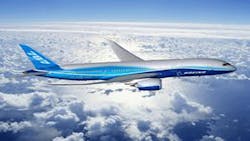US Safety Board Finds Clue to Boeing Fire, Faults FAA
WASHINGTON -- The National Transportation Safety Board on Thursday criticized the government's certification process for the troubled Boeing 787 and said it had pinpointed how a battery fire occurred on one of the planes.
NTSB chairwoman Deborah Hersman said investigators probing the January 7 incident on a Japan Airlines 787 Dreamliner found evidence pointing to a single cell on the battery that caught fire on the plane parked in Boston.
There were multiple signs of short-circuiting in the cell, one of eight on the lithium-ion battery, which led to an uncontrollable rise in temperatures, or thermal runaway, to adjacent cells, she said.
"We are now working to identify the cause of the short circuit on cell six," she said at a news conference. "We have not reached any conclusions at this point."
The battery fire, and a burned battery that forced an All Nippon Airways 787 flight into an emergency landing on January 16, resulted in the global grounding of all 50 787s in service until the problem is fixed.
As the groundings entered a fourth week, Hersman said NTSB investigators were examining the design, manufacturing and charging of the batteries.
She meanwhile faulted the battery's certification by the Federal Aviation Administration (FAA), which cleared the all-new 787 as a safe aircraft more than two years ago after extensive testing.
"The assumptions used to certify the battery must be reconsidered," she said, adding that her agency was conducting tests to determine "why hazards were not mitigated."
As part of the normal FAA certification process, which focuses solely on safety, the FAA relied heavily on information provided by Boeing (IW 1000/16), she said.
Boeing had estimated that a battery smoke event would occur less than once in 10 million flight hours, while it has instead happened twice in less than 100,000 flight hours, she said.
"We have seen two events on two aircraft less than two weeks apart," she said.
Transportation Secretary Ray LaHood, in a statement following the NTSB news conference, said the FAA, which is also investigating the two burned battery incidents, would take "any action necessary to further ensure safety."
FAA Not Ready to Reach Conclusions
"We must finish this work before reaching conclusions about what changes or improvements the FAA should make going forward," LaHood said.
Late Thursday, the FAA approved Boeing's request to conduct 787 test flights.
"These test flights will be an important part of our efforts to ensure the safety of passengers and return these aircraft to service," the FAA said.
Boeing said, in a separate statement, it would conduct the test flights "soon."
"While our work to determine the cause of the recent battery incidents continues in coordination with appropriate regulatory authorities and investigation agencies, we are confident that 787 is safe to operate for this flight-test activity," Boeing said.
Earlier the Chicago-based company said it would "not hesitate" to make changes that lead to improved testing processes and products.
Hersman said the NTSB continued to work closely with Japanese and French counterparts.
French firm Thales designed the Dreamliner's electrical system and commissioned Japanese firm GS Yuasa to produce the batteries.
A detailed NTSB report on the two-track probe -- investigation of the fire and a review of the battery certification and testing -- will be issued within 30 days, Hersman said.
Since the global grounding, the aerospace giant has halted deliveries of the 787, which began service in October 2011 as an energy-efficient aircraft making extensive use of lightweight composite materials and pioneering electrical systems.
Boeing has continued a production pace of five 787s a month.
Richard Aboulafia, an aerospace industry analyst at Teal Group, predicted the prolonged investigation could result in the need for "re-certification," keeping the 787 grounded for six months or longer.
-Veronica Smith, AFP
Copyright Agence France-Presse, 2013
About the Author
Agence France-Presse
Copyright Agence France-Presse, 2002-2025. AFP text, photos, graphics and logos shall not be reproduced, published, broadcast, rewritten for broadcast or publication or redistributed directly or indirectly in any medium. AFP shall not be held liable for any delays, inaccuracies, errors or omissions in any AFP content, or for any actions taken in consequence.
